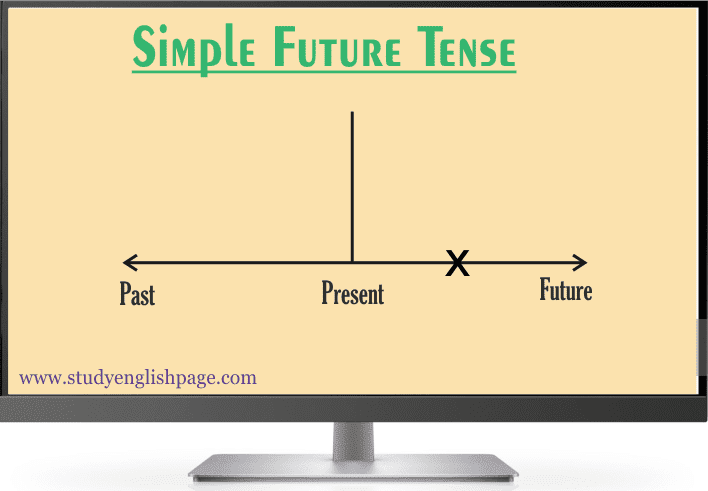Simple Future Tense
The simple future tense is used to show an action which will happen in the upcoming time. We can also define it as an action which is promised /thought to occur in the future.
Examples:
- I will tell the story tomorrow.
- They will visit us.
This tense is
used to predict activity in the future.
As: The year
2222 will be a very interesting year.
Graphical Interpretation:

Simple Future Tense Form
We use the present form of the verb. Auxiliaries which we use in this tense are will and shall. We use ‘shall’ with I and We in British English. To make a negative sentence, we use NOT with auxiliary. In questions, we use auxiliary at the beginning of the sentence.
Affirmative:
Subject + will/shall + verb + . . . . . . .
- You will help him later.
- I will send you a message.
- She will visit New York next month.
- They will play football next year.
- We shall support people in crises. (Br Eng)
Negative:
Subject + will/shall + not + verb + . . . . . . .
- You won’t help him later.
- I will not send you a message.
- She will not visit New York next month.
- They will not play football next year.
- I won't tell anyone your secret.
- We shall not support people in crises. (Br Eng)
Interrogative:
Will/shall +
subject +verb + . . . . . . .
- Will you help him later?
- Will you help me in doing my homework?
- Will she visit New York next month?
- Will they play football next year?
- Shall you support people in crises? (Br Eng)
Negative and Interrogative:
Will +
not + subject + verb + . . . . . . .
- Will not you help me in doing my homework?
- Won’t you help me move this heavy table?
- Will not she visit New York next month?
- Will not they play football next year?
Will/shall + subject + not + verb + . . . . . . .
- Will you not help me in doing my homework?
- Will you not help me move this heavy table?
- Will she not visit New York next month?
- Will they not play football next year?
- Shall you not support people in crises?
No Future in Time Clauses
We do not
use the simple future tense in time clauses beginning with time
expressions such as: when, while, before, after, by the time, as soon as, if,
unless, etc. Instead of the simple future tense, we use the simple present tense.
Examples:
- When you will come, we will go out for dinner. Not Correct
- When you come, we will go out for dinner. Correct
Be going to + verb
This
structure is used in order to show an activity which will take place in the future
at some time. “Be going to” means (will), but there is a little difference. It
shows strong intention about the expected action in the upcoming time. We use the basic
form of the verb after ‘be going to.
Examples:
- He is going to visit his uncle.
- We are going to launch a new project.
- Se is going to go to Peshawar next Sunday.
- She is not going to go to Peshawar next Sunday.
- Are we going to launch a new project next month?
Yes/No Questions and short Answers
A question that is answered by Yes or No is called a Yes/No Question.
A short answer
means to use just subject and auxiliary after yes or no to give an answer. A comma
is used after Yes or No.
Ex:
- Will you continue your study?
Yes, I will.
- Will Ali take admission in a university?
No, he will
not.
- Will they call us before going out?
Yes, they will.
Information Questions (wh questions) and Answers
A question
which is asked to interrogate or get information is called an information
question.
Ex:
- What will she write?
She will write stories for kids.
- Where will Ali study?
He will take admission in a university
in New York.
- When will you watch this movie?
I will watch this video today night.
- Why will you watch a movie today night?
Because I will be free today night.
- Who will cook for you tonight?
I will cook myself.
- Whose car will you borrow to go to Lahore?
I will borrow it from one of my friends.
- Which will be your favorite candidate in the upcoming election?
My favorite candidate will be Bob.
Contract
forms or short forms
|
|
Short-form |
|
Short-form |
|
He will |
He’ll |
She will |
She’ll |
|
It will |
It’ll |
They will |
They’ll |
|
I will |
I’ll |
We will |
We’ll |
|
You will |
You’ll |
Will not |
Won’t |
|
Shall not |
Shan’t |
|
|
- He’ll write a letter to Prime Minister.
- She’ll do her homework at night.
- It’ll be rainy tomorrow.
- They’ll attend the meeting.
- I’ll call you tonight.
- We’ll participate in the competition.
- You’ll have a tough time before the examination.
- They won’t pay attention to my words.
- We shan’t go out this weekend.
